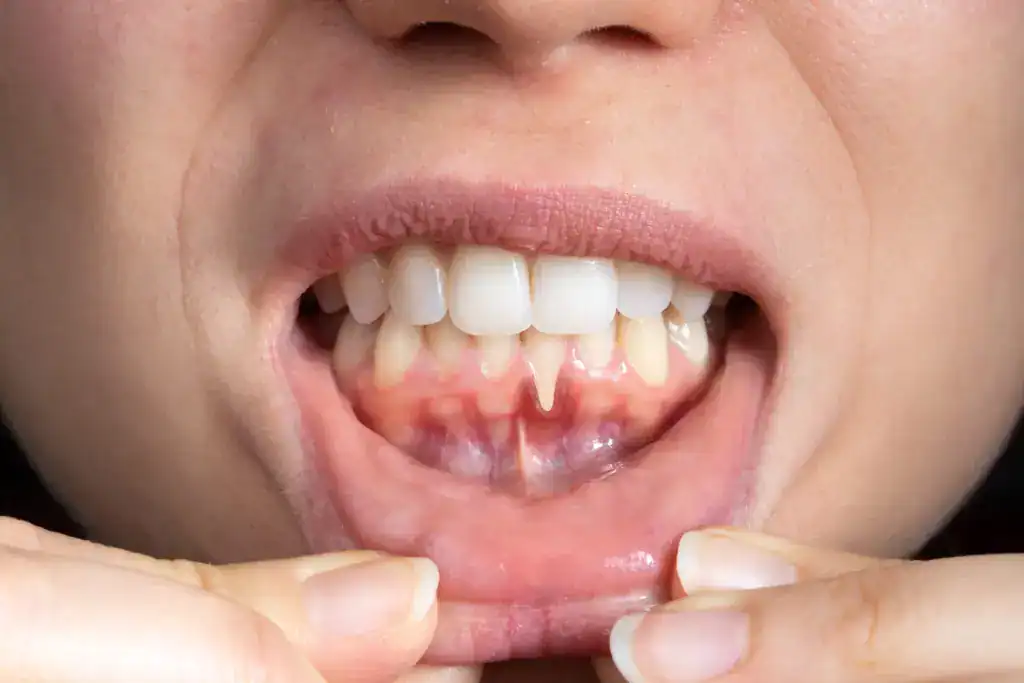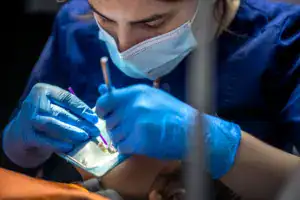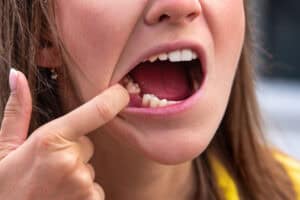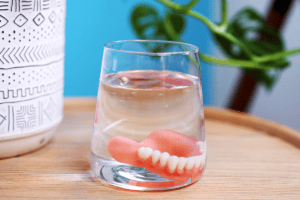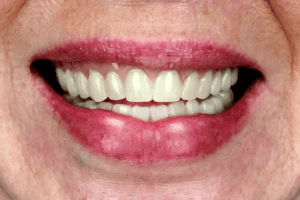Gum recession is also a consequence of poor oral health, and can eventually lead to tooth loss. Tooth roots are more susceptible to decay than the surfaces that are covered with enamel, and so, when gums recede too far, you become more likely to develop gum disease. Receding gums cannot grow back. However, changes to your oral hygiene, including working with a professional can prevent and stop gum recession, and some treatments can rebuild gum tissue. First, let’s discuss the finer details of periodontal disease and what causes receding gums.
Common symptoms
Here are some of the most common symptoms of receding gums:
- Bleeding after brushing or flossing
- Red, swollen, painful gums
- Visibly shrinking gums
- Exposed tooth roots
- Tooth sensitivity
- Loose teeth
In some cases, diseased gums will not show obvious signs of recession due to swelling and inflammation, however, once this issue has been managed, recession may take place. Receding gums and other forms of periodontal disease are diagnosed by a dentist. They will often do a physical examination with a probe—a ruler that measures the size of the gum pockets. Normal pocket sizes range from 1 to 3 millimetres, with anything larger being a sign of receding gums. As well as being able to give you a diagnosis, dentists can tell you how to treat receding gums.
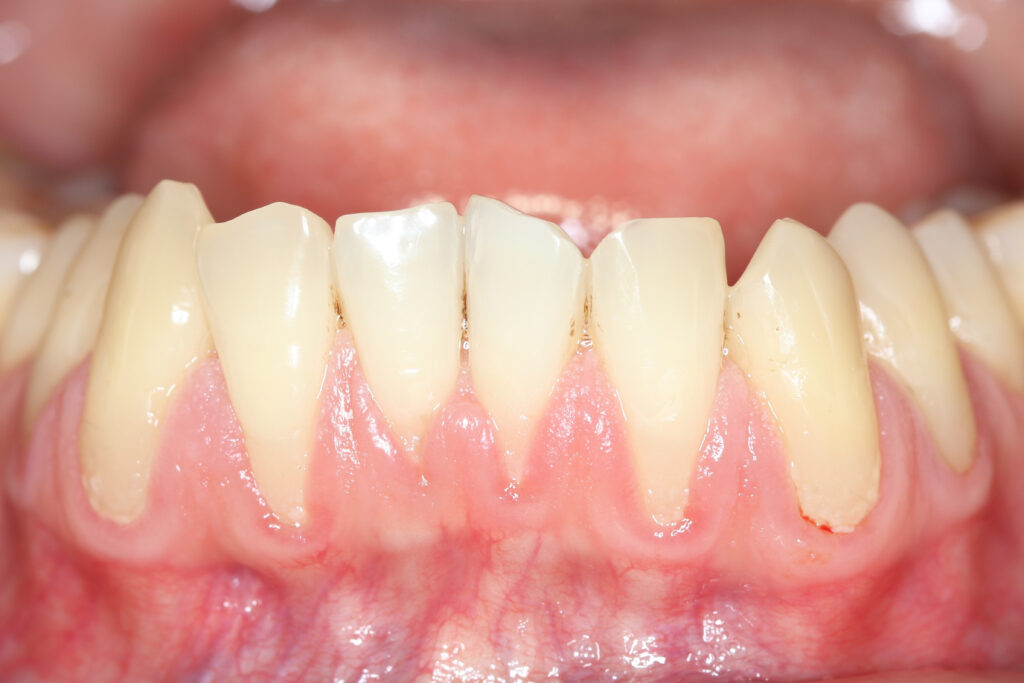
Causes and risk factors
There are multiple potential causes of receding gums and some important risk factors to be aware of. So, what causes receding gums?
- Aggressive brushing: Hard or incorrect brushing technique with a hard bristle brush can encourage gum recession over an extended period of time.
- Poor oral hygiene: A lack of brushing and flossing can lead to a buildup of bacteria in the mouth.
- Genetic predisposition: Some people have naturally thin gums, called thin biotype, which means that they are more prone to receding.
- Teeth grinding: Bruxism puts intense pressure on the teeth and gums, and so, over time, this may cause gums to recede and can result in loose teeth.
- Traumatic injury or tooth movement: Direct trauma to the gum tissue may cause the gum in that area to recede. This trauma could include anything from a fall, to wearing ill-fitting partial dentures.
Other possible risk factors can include:
- Hormonal changes
- Smoking
- Diabetes
- HIV
- Medications that cause dry mouth
- Improper positioning or alignment of teeth
Can receding gums be reversed?
The long answer is that, yes, receding gums can be reversed through specific treatments. However, it’s important to not confuse this fact with the idea that gums can grow back, because they can’t. But, some treatments can reconstruct gum tissue with effective results. Researching the truth about gum disease makes it easy to feel as though you don’t know how to fix receding gums, but there are plenty of effective solutions out there, including to stop gum recession and offer preventative measures.
How to prevent receding gums
Now, let’s discuss how to stop receding gums. If you have poor oral hygiene and don’t know where to start, visiting a dentist for a consultation and deep dental cleaning is the best way to determine the most effective course of action. If you want to maintain good oral hygiene, you can do so by:
- Adopting a proper brushing technique
- Avoiding harmful habits, such as smoking/vaping
- Attending regular dental checkups
- Using a fluoride toothpaste
- Using a soft-bristled brush
- Using antiseptic or fluoride mouthwash
Other preventative measures may include wearing a mouthguard if you grind your teeth at night, or replacing ill-fitting dentures. If you’re concerned about developing periodontal disease, it is best to get a checkup at a dental practice. To read more: How To Stop Grinding Teeth in Sleep
Treatment
If you are suffering from any of the above symptoms, it is important to visit your dentist so that they can implement proper care and show you how to stop receding gums. Ultimately, deciding how to treat receding gums depends on the underlying cause. When incorrect brushing practices are the cause, the first step is to reevaluate your personal dental care. This could include changing toothbrushes regularly, using a toothbrush with softer bristles, switching to toothpaste for sensitive teeth, and attending regular dental checkups.
Medication
Other, non-surgical treatments can include topical antibiotics and antimicrobial mouth rinses.
Scaling and root planing
Generally, when deciding how to fix receding gums, this solution may crop up. Scaling is when a dentist removes the build-up of plaque and tartar around the gumline. They will then begin root planing which involves smoothing out the tooth root to encourage the gums to reattach to the teeth.
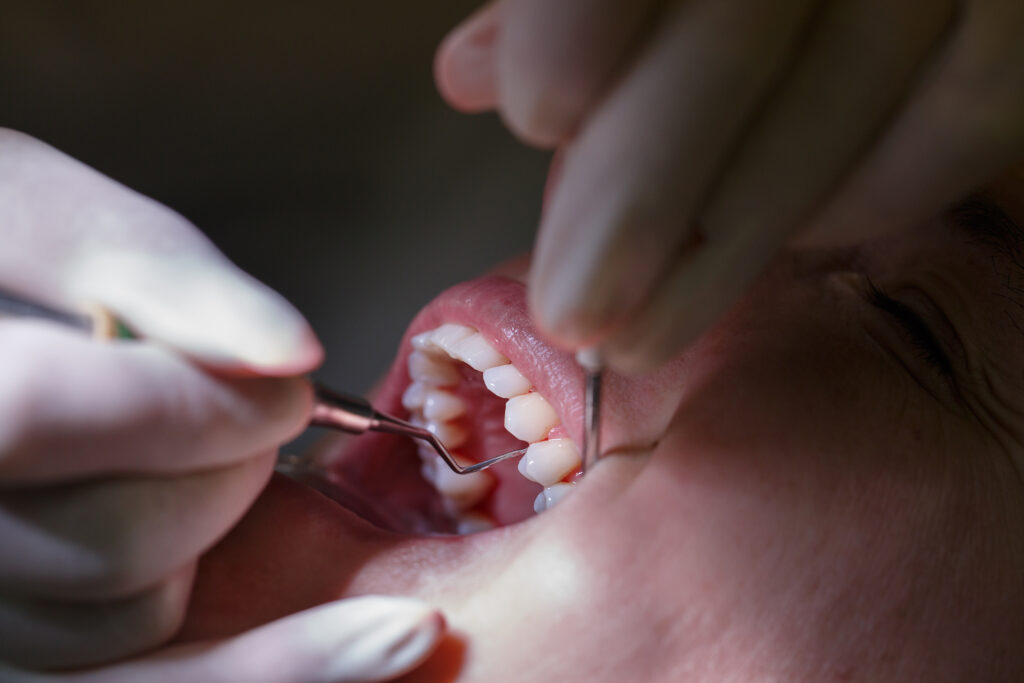
Gum graft surgery
In this a relatively straightforward procedure in which a dentist will take gum tissue from the roof of a patient’s mouth and use it to build the gum in the areas where it has receded.
Veneers and dental implants
If you are experiencing negative effects from gum recession, the first port of call is visiting your dentist to determine the underlying cause and best course of treatment. Once poor oral hygiene is corrected, some great cosmetic treatments to restore your smile can be offered. This is where Advanced Dental Artistry’s porcelain veneers and dental implants come in.

Our hand-crafted porcelain veneers can help restore a more natural, uniform look to your smile with high-quality materials that fix the problem of yellowed, chipped, or cracked teeth. Our specially designed dental implants are the perfect solution for loose or missing teeth that can result from gum recession. The bespoke implants are expertly crafted to suit your face and mouth, providing you with a smile with a natural look and feel.
Love your smile
Periodontal disease is much more common than you might think. It can be an uncomfortable and even painful condition to live with, but that doesn’t mean it can’t be prevented or treated. To find our how our cosmetic dentistry solutions can promote better oral health, reach out to our friendly, compassionate Perth cosmetic dentist team at Advanced Dental Artistry to book a consultation.

